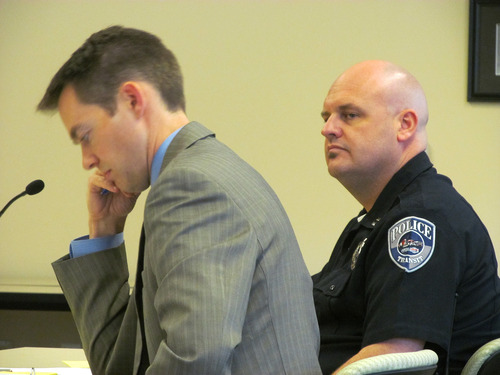This is an archived article that was published on sltrib.com in 2012, and information in the article may be outdated. It is provided only for personal research purposes and may not be reprinted.
The State Records Committee voted 3-2 on Thursday to stop what its chairwoman said is an attempt by the Utah Transit Authority to use high fees to block access to public data.
It ordered UTA police to give free access to public data in its crime database to The Salt Lake Tribune.
UTA argued that extracting public information from databases would cost $5,000 to $10,000 — which it said The Tribune should pay. It also said that merely allowing reporters to look at paper reports to gather data would violate laws because protected portions might be seen. It said paying overtime to employees to censor such reports would cost up to $2,500 — which it also said The Tribune should pay.
Concerns about protecting nonpublic portions of police data led two members to oppose the order.
But Committee Chairwoman Betsy Ross said attempting to require such high fees for what state law defines as public information shows "there has been an effective denial of access."
The newspaper filed an open-records request in May for data about crime in 2011 — including individual offenses, location and date — as part of ongoing efforts to map crime in Salt Lake County.
It filed similar requests with 15 other police agencies. Fourteen quickly provided that data, including 12 that provided it for free. The other two charged a total of $77.50. Several of those agencies use the same vendor — FATPOT — as UTA does to maintain databases.
UTA and the Utah Highway Patrol were the only two agencies that said they could not comply with The Tribune request. UHP said it did not maintain its 2011 crime records in an easily accessible electronic format but added it had fixed that for 2012 and that such records will be made available in the future.
But UTA has made no such change.
UTA police Capt. Jason Petersen testified that providing requested data would be expensive, largely because of poor relations between his department and FATPOT.
He said FATPOT promised when it started maintaining its database that his agency would be easily able to retrieve data similar to what The Tribune has requested, but that has not happened amid a variety of technical problems. He said UTA has been unable, for example, to extract data to analyze crime by area.
"We have a very stressed relationship with our vendor because it is not providing what we expected," he said, "so we are looking at breach-of-contract issues."
Petersen said FATPOT told UTA it would charge $5,000 to $10,000 for special work to provide data The Tribune requested. David Mull, attorney for UTA, suggested that the Records Committee might want to subpoena FATPOT to question it directly about high costs and poor relations.
"That is not our responsibility," Ross responded. "It is UTA's responsibility and UTA's contractor. I am more likely to hold UTA responsible than I am FATPOT."
Tony Semerad, The Tribune's editor for computer-assisted reporting, testified that UTA "is essentially saying we have created a lot of very expensive obstacles for you for which you have to pay." Tribune reporter Janelle Stecklein said the newspaper is willing to pay about what other police agencies charged. "The problem is we are talking like 100 times more," she said.
Semerad said the records fight has been eye-opening.
"What our request has, frankly, kind of exposed is they [UTA] cannot themselves access or analyze this data in a way that would presumably inform critical public-policy decisions that they are making."
Committee member Patricia Smith-Mansfield said, "I'm seeing an issue here larger than access. … It seems to me that these records are at risk."



